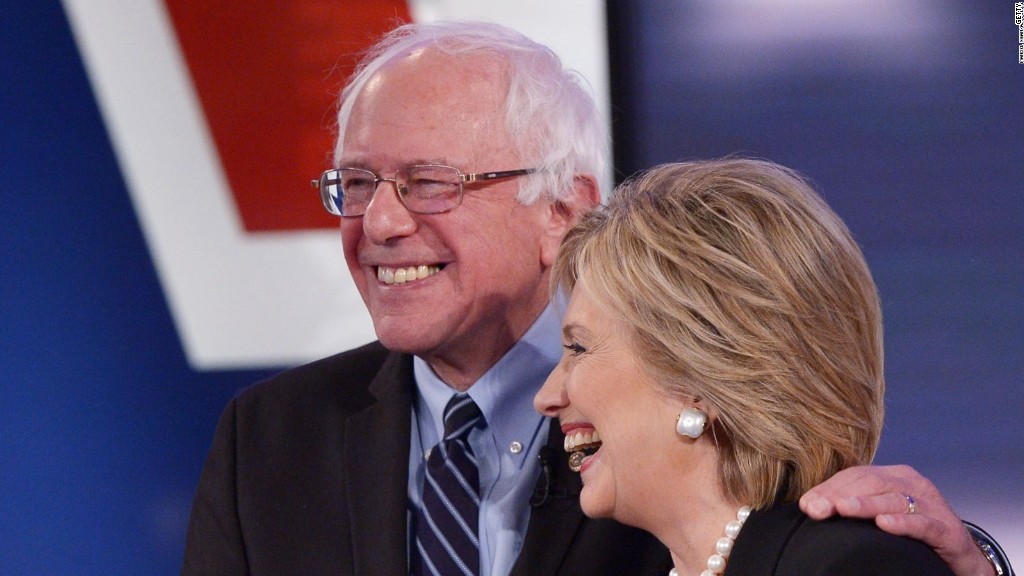
Hillary Clinton won't rule out appointing a Wall Street veteran to the top economic post in the White House.
In contrast, Bernie Sanders vows that if he's elected president, no one from Goldman Sachs (GS) will work in his administration.
"You have to have a Treasury Secretary who understands the economy, the American economy and the global economy," Clinton said Sunday on NBC's "Meet the Press."
Clinton is under fire for her ties to Wall Street. Clinton has become a millionaire from giving numerous speeches to big banks and investment firms -- pocketing about $200,000 apiece.
When Clinton was pressed on whether she would appoint someone from Wall Street to be her Treasury Secretary, she refused to say no.
"What I believe is there are good actors and bad actors in every part of our economy," she said. "The job of the president is to weed out and prevent the bad actors from disrupting economic activity."
She tried to cast Sanders as too "extreme" and naive on economic policy.
Related: $153 million in Bill and Hillary Clinton speaking fees, documented
Wall Street has been a big donor to Hillary
Many of America's recent Treasury Secretaries, including current secretary Jack Lew, have worked on Wall Street or gone there shortly after their service to the nation ended.
In her 2008 campaign, five Wall Street firms (JPMorgan (JPM), Goldman Sachs, Citigroup (C), Morgan Stanley (MS) and Lehman Brothers) were among the top 10 corporate donors to her campaign, according to data compiled by OpenSecrets.
This time around, Hollywood and unions are playing a bigger role as donors to Clinton's main campaign fund. Wall Street has been giving heavily to PACs (political action committees).
Clinton tries to cast herself as a "clear-eyed capitalist." She doesn't want to be seen as an enemy of business. But she also wants to be viewed as a champion of the middle class and disadvantaged.
"I think she's a pragmatist when it comes to dealing with banks and Wall Street," says Greg Valliere, chief strategist at Horizon Investments. "I wouldn't say she's a strong ally, but I wouldn't view her as an adversary."
Related: The Bernie Sanders pledge: A Goldman Sachs-free cabinet
Hillary wants to be 'clear-eyed capitalist'
It's a cautious line to walk. In Iowa, where Clinton barely eked out a win, 44% of likely Democratic voters identified openly as "anti-Wall Street" in a Bloomberg/Des Moines Register poll in early January. In New Hampshire, Sanders has a commanding lead.
"Frankly Wall Street has been Bernie Sanders' most effective tool in his campaign against Hillary," says Peter Kenny, a long-time stock trader and market strategist. "It's a fair portrayal of her....Wall Street by and large would have no problem with a Clinton presidency."
Clinton's Wall Street problem has become such a hindrance that she canceled a fundraiser with a venture capitalist in Boston that has ties to Bain Capital (Mitt Romney's old firm). She's staying away from the New York scene in February, according to her calendar.
Wall Street doesn't seem to know how to react.
Larry Fink, the CEO of large investment firm BlackRock (BLK), echoed a lot of Clinton's economic views in his annual letter. There's some speculation Fink could be angling for the Treasury Secretary role.
Meanwhile, the head of Goldman Sachs, Lloyd Blankfein, told CNBC last week that all the anti-Wall Street rhetoric "has potential to be a dangerous moment."


